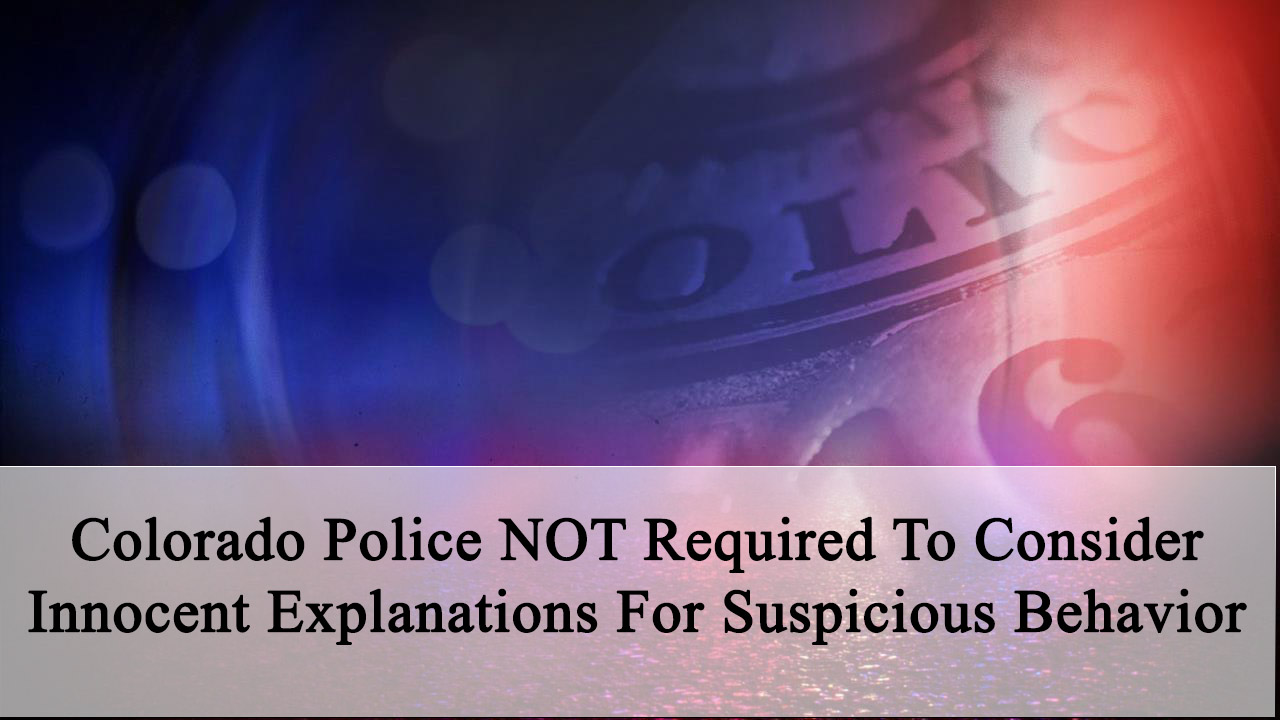






Colorado Police NOT Required To Consider Innocent Explanations For Suspicious Behavior
By H. Michael Steinberg Colorado Criminal Defense Lawyer
 Colorado Police NOT Required To Consider Innocent Explanations For Suspicious Behavior – It is a common belief that the police must give you the benefit of the doubt when they are investigating when they suspect is a possible criminal act. That common belief is wrong.
Colorado Police NOT Required To Consider Innocent Explanations For Suspicious Behavior – It is a common belief that the police must give you the benefit of the doubt when they are investigating when they suspect is a possible criminal act. That common belief is wrong.
A Reasonable, Articulable Suspicion That Criminal Behavior Is “Afoot”
Before the police can detain you for what is called an “investigatory stop” that investigatory stop must be based on a “reasonable, articulable suspicion of ongoing criminal activity.”
I often receive these kinds of questions:
“Why didn’t the police consider that I was just out for a walk that morning? Or
“I often sleep in my car, or go for late night walks in this neighborhood – why don’t the police just leave me alone?”
Which begs some questions.
What if there are “innocent explanations” for otherwise suspicious behavior that is observed by the police or conveyed to them by other sources?
And if there are, do the police have to consider these possible “innocent explanations” behavior before conducting the investigatory stop.
As unfair as it may seem, the answer is no – they do NOT have to consider innocent explanations as possibilities for otherwise “suspicious behavior.”
The Colorado Courts of Appeal and the United States Supreme Court do not require an officer to consider every possible innocent explanation for criminal behavior.
In a recent Colorado case, a Colorado police officer observed a person:
…driving around late at night, going in and out of unfinished houses in an area where there had been recent break-ins of unfinished houses, and carrying a black bag.
In this case (Colorado Reyes Case ) there were, as the lower court found, “innocent explanations” for the suspect’s behavior that were consistent with the construction of new homes. The Defendant moved to suppress incriminating evidence discovered as a result of the investigatory stop conducted in that case.
Quick note: Under Colorado law, the “fruits”” of a constitutionally unlawful investigatory stop must be suppressed and cannot be used against the accused.
In the Reyes case the Defendant argued that the police officers did not have a reasonable, articulable suspicion for initially stopping and talking to him.
The Colorado Reyes Case Facts:
(1) the caller, who was willing to identify himself, called law enforcement around 11:30 p.m. to report a possible break-in in a partially developed residential area;
(2) there had been several recent break-ins in the area in which people stole copper from unfinished houses;
(3) the caller said that a person driving a boxy van was going in and out of unfinished houses; and
(4) the caller saw that person leave one of the houses with a black bag and a get into the van. Reyes-Valenzuela based his argument partially on the fact that contractors sometimes worked late at night on the unfinished houses.
Additional facts in this case were developed by the only witness to the Defendant’s actions. The witness – called to testify at the Motion to Suppress hearing – also stated as follows:
(1) She did not know whether Reyes-Valenzuela was authorized to enter the houses;
(2) She did not know if the black bag belonged to him;
(3) She knew that contractors sometimes worked late at night on the unfinished houses;
Under these facts the Court held – on appeal – that police were not required to consider the possible innocent reasons for his entry of several unfinished houses late at night.
Colorado Criminal Law On Brief Investigatory Stops
Under Colorado law police officers may make a brief investigatory stop:
“when an officer has a reasonable, articulable suspicion that criminal activity ‘has occurred, is taking place, or is about to take place.’”
What follows is the actual statutory law in this area – codified in Colorado Revised Statute Section 16-3-103(1), C.R.S.., which states as follows:
“[a] peace officer may stop any person who he reasonably suspects is committing, has committed, or is about to commit a crime and may require him to give his name and address, identification if available, and an explanation of his actions.”
A Colorado law enforcement officer’s investigatory stop must comply with the Fourth Amendment.
For an investigatory stop to pass “constitutional muster” – three criteria must exist:
(1) the officer must have “an articulable and specific basis in fact for suspecting (i.e., a reasonable suspicion) that criminal activity has taken place, is in progress, or is about to occur”;
(2) the intrusion’s purpose must be reasonable; and
(3) the character and scope of the intrusion must be “reasonably related to its purpose.”
In determining whether an officer has a reasonable, articulable suspicion, Colorado law:
….”focuses upon ‘whether there were specific and articulable facts known to the officer, which taken together with reasonable inferences from these facts, created a reasonable suspicion of criminal activity to justify the intrusion into the defendant’s personal security.’”
To answer this question, Judges are mandated to look at the “totality of the circumstances.” The analysis requires a review of the facts from an objective standard – and not the subjective intent of the officer.
In Colorado Innocent Behavior Can Still Provide A Basis For Probable Cause
“Nor do we focus on plausible innocent explanations for behavior that may be suspicious. The U.S. Supreme Court has held that “innocent behavior will frequently provide the basis for a showing of probable cause.”
When determining whether reasonable, articulable suspicion exists, “the relevant inquiry is not whether particular conduct is ‘innocent’ or ‘guilty,’ but the degree of suspicion that attaches to particular types of noncriminal acts.”
The fact that innocent explanations may be imagined does not defeat a probable cause showing. Instead, the police are entitled to draw appropriate inferences from circumstantial evidence, even though such evidence might also support other inferences.
Summary And Conclusion – Colorado Police NOT Required To Consider Innocent Explanations For Suspicious Behavior
Bottom line – Colorado police officers are not required to consider innocent explanations for behavior that otherwise would support reasonable, articulable suspicion. The police are entitled to draw appropriate inferences from circumstantial evidence, even though such evidence might also support other “innocent” inferences.
The legal analysis looks like this:
Fourth Amendment issues analysis in the context of warrantless stops can be broken down into five basic questions:
1. Did a seizure occur?
2. If so and it was a stop, was it supported by reasonable suspicion or other valid basis?
3. If reasonable suspicion supported the stop, was the officer’s subsequent conduct sufficiently limited in scope?
4. If the seizure was an arrest, was it supported by probable cause?
5. If the arrest was supported by probable cause, was the search permissible

Colorado Fourth-Amendment-Chart
Colorado Police NOT Required To Consider Innocent Explanations For Suspicious Behavior
If you found any of the information I have provided on this web page article helpful please click my Plus+1 or the Share buttons for Twitter and Facebook below so that others may also find it.
The reader is admonished that Colorado criminal law, like criminal law in every state and at the Federal level, changes constantly. The article appearing above was accurate at the time it was drafted but it cannot account for changes occurring after it was uploaded.
If, after reading this article, you have questions about your case and would like to consider retaining our law firm, we invite you to contact us at the Steinberg Colorado Criminal Defense Law Firm – 303-627-7777.
Never stop fighting – never stop believing in yourself and your right to due process of law. You will not be alone in court, H. Michael will be at your side every step of the way – advocating for justice and the best possible result in your case. H. Michael Steinberg is passionate about criminal defense. His extensive knowledge and experience of Colorado Criminal Law gives him the edge you need to properly handle your case
 ABOUT THE AUTHOR: H. Michael Steinberg – Email The Author at:
ABOUT THE AUTHOR: H. Michael Steinberg – Email The Author at:
A Denver Colorado Criminal Defense Lawyer – or call his office at 303-627-7777 during business hours – or call his cell if you cannot wait and need his immediate assistance – please call 720-220-2277.
“A good criminal defense lawyer is someone who devotes themselves to their client’s case from beginning to end, always realizing that this case is the most important thing in that client’s life.”
You should be careful to make a responsible choice in selecting a Colorado Criminal Defense Lawyer. We encourage you to “vet” our firm. Over the last 40 plus years – by focusing ONLY on Colorado criminal law – H. Michael has had the necessary time to commit to the task of constantly updating himself on nearly every area of criminal law, to include Colorado criminal law and procedure and trial and courtroom practice. H. Michael works hard to get his clients the best possible results in and out of the courtroom. He has written, and continues to write, extensively on Colorado criminal law and he hopes this article helps you in some small way – Colorado Police NOT Required To Consider Innocent Explanations For Suspicious Behavior.

Other Articles of Interest:
- Failure to register As A Sex Offender 18-3-412.5 (3)
- Colorado Criminal Law – Auto Stops – Drug Dogs – Smell Of Marijuana – And Searches of Your Car
- If You Are Arrested In Colorado
- Colorado Self Defense Law – How To Avoid Being Charged Yourself – Dealing With The Police Investigators
- Understanding Arrest, Custody and “Investigative Detentions” General Principles






















